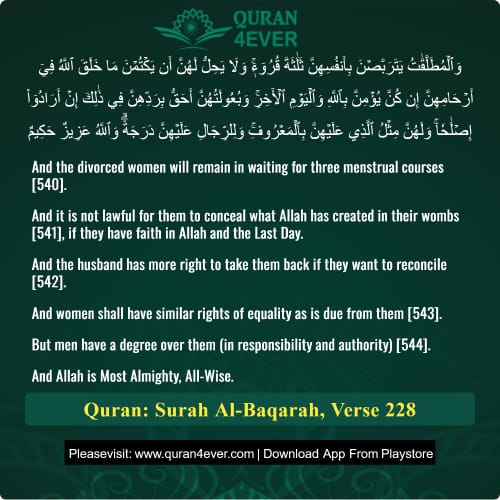
Transliteration:( Walmutallaqaatu yatarab basna bi anfusihinna salaasata qurooo'; wa laa yahillu lahunna ai yaktumna maa khalaqal laahu feee arhaaminhinna in kunna yu'minna billaahi wal yawmil aakhir; wa bu'oola tuhunna ahaqqu biraddihinna fee zaalika in araadooo islaahaa; wa lahunna mislul lazee alaihinna bilma'roof; wa lirrijjaali 'alaihinna daraja; wallaahu 'Azeezun Hakeem )
228. And the divorced women will remain in waiting for three menstrual courses [540]. And it is not lawful for them to conceal what Allah has created in their wombs [541], if they have faith in Allah and the Last Day. And the husband has more right to take them back if they want to reconcile [542]. And women shall have similar rights of equality as is due from them [543]. But men have a degree over them (in responsibility and authority) [544]. And Allah is Most Almighty, All-Wise.
This verse makes it clear that a divorced woman must observe a waiting period (iddat) of three menstrual cycles before remarrying.
🔹 It also affirms that an adult woman is independent in her decisions—no guardian can force her in this matter.
🔹 The iddat of 4 months and 10 days applies only if consummation of marriage took place; otherwise, iddat is not necessary, as clarified elsewhere in the Qur'an.
Two rulings are derived from this part:
A woman in iddat must not conceal her pregnancy or menstruation. Doing so may cause grave consequences in a future marriage.
In matters of iddat and pregnancy, the woman's statement is given precedence. If she claims her iddat is over and the husband disputes it, her word is accepted.
In the case of a revocable (raj‘ee) divorce, the husband may revoke the divorce during iddat without needing a new nikah.
🔹 This revocation does not require the wife's consent, but it should be done without force or coercion.
🔹 Mutual agreement and desire to rebuild the marriage is considered best and most encouraged.
Two key points arise:
A wife’s role is to serve and support her husband, while the husband’s duty is to provide for her needs.
A maid or slave-girl cannot be equated with a wife, as wives have legal and moral rights which maids do not possess.
This verse clearly states that men have a degree (darajah) over women, which refers to their greater responsibility and leadership in the marital relationship.
🔹 The man bears the burden of financial support, dower (mehr), and protection, which grants him greater authority.
🔹 Therefore, any claim that husband and wife have exactly equal rights is false—justice and responsibility are not based on identical roles but balanced duties.
The tafsir of Surah Baqarah verse 227 by Ibn Kathir is unavailable here.
Please refer to Surah Baqarah ayat 226 which provides the complete commentary from verse 226 through 227.
(2:228) Divorced women shall keep themselves in waiting for three menstrual courses and it is unlawful for them, if they believe in Allah and the Last Day, to hide whatever Allah might have created in their wombs. Should their husbands desire reconciliation during this time they are entitled to take them back into wedlock.[249]
Women have the same rights against their men as men have against them; but men have a degree above them. Allah is All- Powerful, All-Wise.
249. Jurists disagree about the legal import of this verse. According to some, as long as a woman has not completed her third menstrual period repudiation will not have the effect of irrevocable divorce. This is the view of Abu Bakr, Umar, ‘Ali, Ibn ‘Abbas, Abu Musa al-Ash’arl, Ibn Mas’ud and several distinguished Companions of the Prophet. This is also the accepted doctrine of the Hanafi jurists. On the other hand, another group of jurists is of the view that, as soon as the third monthly period of a woman begins, the husband ceases to have the right to revoke the divorce. This is the view of , ‘A’ishah, Ibn ‘Umar and Zayd ibn Thabit, and has been accepted by, the Shafi’i and Maliki jurists. It should be clear, however, that this injunction is applicable only when the husband has pronounced single or double divorce. In case of triple divorce, the husband ceases to have the right of revocation. (See Jassas, vol. 1. pp. 364 ff. – Ed.)
[86]- Either menstrual periods or periods of purity between menstruation. See also 65:1-7. [87]- The husband may return her to himself during the ʿiddah period of a first and second divorce without a new marriage contract. [88]- The wife has specific rights upon her husband, just as the husband has rights upon her.

For a faster and smoother experience,
install our mobile app now.
Related Ayat(Verses)/Topics